
















How to Start Preparing for Hard Times
on a Very Modest Budget
Copyright © February 10, 2010 and February 24, 2010 by Robert Wayne Atkins, P.E.
All Rights Reserved.
The first half of following information was presented during a two-hour talk radio talk show on the Texas Broadcasting Network on February 11, 2010.
The second half of the following information was presented during a two-hour talk radio talk show on the Texas Broadcasting Network on February 25, 2010.
Introduction
 Nobody knows how the future will unfold. And that includes myself.
Nobody knows how the future will unfold. And that includes myself.
Next month may be the same as this month, or it may be a lot better, or it may be a lot worse. There is no way to know what next month will bring until it actually gets here.
Therefore it would probably be a good idea to have a variety of contingency plans instead of simply believing in one and only one possible future.
For example, it would be sad if you invested your life savings in preparing for an "end-of-the-world event" only to discover that the world doesn't come to an end and that the economy slowly but gradually starts to improve.
On the other hand, it would also be sad if you didn't make a few simple inexpensive investments so your family could survive an "unexpected hard times event" with the least amount of discomfort. That is the purpose of this article. This article will review a few basic things a person could do prior to an actual hard times event so his or her family could survive an unexpected hard times event and be in a better position to have their lives return to "normal" after the event has passed.
With this in mind the following topics will be discussed one at a time:
- Where to Start When You Don't Have Much Money
- Safety Is More Important Than You Think.
- Water: A Simple Solution.
- Food: A Simple Solution.
- Fire and Why it is so Important.
- Personal Hygiene and Clothing.
- Emergency Backpack or Suitcase.
- Other Really Useful Items.
- Where Will You Live?
- Always Have a Backup Plan.
- Secrecy and Other People.
- Things to Avoid.
I Don't Have Much Money and
I Really Don't Know Where I Should Start
 Do you remember the moral of Aesop's Fable of "The Race between the Turtle and the Rabbit?"
Do you remember the moral of Aesop's Fable of "The Race between the Turtle and the Rabbit?"
The moral of the story was: "Slow and steady wins the race."
But how does that moral apply to preparing for hard times?
The answer is simple:
- Relax. Don't panic.
- Avoid impulse purchases motivated by fear.
- Relax. But don't procrastinate. Start today.
- Start by making a plan and then gradually and systematically work your plan.
- In other words, proceed at a slow but steady pace.
For example, you could design a hard times survival plan that was customized for your family's specific needs by doing the following:
- Start with a very brief list of the most important broad categories of things your family would need to survive a hard times tragedy event, such as water, food, and clothing.
- Under each broad category add a more detailed list of the things you would like to have within that category. This is a wish list. Don't be ashamed to add things to your wish list. You can prune your list later.
- Do a little internet window shopping and find out where you could buy each item on your list along with its price at each internet store. Make sure you copy and save the internet address of each store you visit in a special file so you can find that store again later if you decide to buy something from them.
- Carefully analyze your list and prioritize your spending.
- Don't go overboard in a single category. In other words, if you really like clothes then don't invest every spare dollar you have in clothes. If you really like firearms then don't invest every spare dollar you have in firearms. Instead systematically make investments in all of the major categories as money becomes available.
- Take the time to carefully think about each of your purchases before you invest your money.
Safety is More Important Than You Think
Remember your primary objective is to survive a hard times tragedy event and live to a ripe old age.
This objective can be achieved if you will be extra careful whenever you are trying to learn a new skill, and whenever you are trying to learn how to use any type of equipment you have never used before.
For example, most of the following accidents could be avoided if you first take the time to learn and follow the appropriate safety rules:
- Buying some basic hand tools you have never owned or used before, including a hammer, and then severely smashing your thumb the first time you use the hammer.
- Buying your very first firearm and then accidentally shooting yourself or someone in your family.
- Trying to learn how to sharpen a knife using a sharpening stone and then accidentally slicing a huge piece off one of your fingers.
- Buying your first chain saw so you can cut your own firewood and then you become permanently crippled by an accident that could have been avoided if you had just taken the time to receive some proper training in the safe way to use a chain saw.
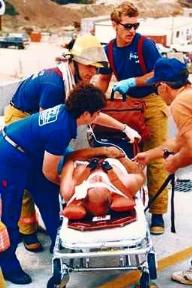 Safety is always important but it is of critical importance during a hard times event because professional emergency medical care may not be immediately available. Therefore, always begin by learning and practicing all the relevant safety rules for whatever you are attempting to do.
Safety is always important but it is of critical importance during a hard times event because professional emergency medical care may not be immediately available. Therefore, always begin by learning and practicing all the relevant safety rules for whatever you are attempting to do.
The following two universal safety rules are always important but they are even more important during hard times:
- Always wear safety glasses. Your eyes are too important to your survival to lose one or both of them. Therefore during a hard times tragedy event always wear safety glasses, even when you are just sitting down and doing nothing. You can purchase a good pair of safety glasses for less than $5 at almost any store that sells hand tools. Aren't your eyes worth a simple $5 investment?
(Note: On two different occasions during my life I have had an extremely tiny object embed itself in one of my eyes. The object was so small that I couldn't see it in a mirror but it was very uncomfortable and my eye watered continuously. On both occasions I tried flushing the object out but it was embedded and it would not come out. I had to visit an eye doctor and have my eye numbed while he located the object and then extracted it. The first time I was outdoors and a sudden strong wind blew the tiny object into my eye. The second time something heavy fell on the ground beside me and the impact sent a tiny object flying upwards into my eye. Both of these painful experiences could have been avoided if I had been wearing safety glasses.)
- Be careful when lifting or moving anything bulky or heavy. Don't injure your back and then live in pain for the rest of your life. My father was in the Accident Insurance Business for thirty-years and he told me that one of the most common accidents was when a woman who was at least 40 years old attempted to move or rearrange a mattress on a bed. The mattress was too big to get a good grasp on it and the lady would bend over into a really bad lifting position and then throw her back out of alignment. You can avoid a similar injury by learning the basic rules about how to lift things using your legs instead of your back, and then not lifting anything that is too heavy or too awkward to be easily moved by one person.
Water: A Simple Solution
The vast majority of the people in the United States really don't appreciate how important water is to their daily lives. However, if their normal supply of water suddenly becomes unavailable due to an unexpected hard times event then they quickly become aware of something that almost everyone else in the world already knows:
- Without water a person will gradually dehydrate and die in about three days.
If you have ever watched the T.V. news coverage of an area that had been unexpectedly devastated by a hard times event then you may have noticed that people have fought and killed one another over water. Since most people in the United States have never been on the edge of death due to water dehydration they can't understand how people could do such things and they write it off as being something that could only happen in a third world country. But they would be wrong. If any area here in the United States was deprived of fresh drinking water for more than three days then you would see people here in the United States fighting and killing one another over water.
Therefore a smart person would figure out how to provide his or her family with a continuous supply of fresh drinking water before a hard times event disrupted their normal supply of drinking water.
A simple solution to the water issue is intuitively obvious if you will just think about the following facts:
- Water is very heavy. One gallon of water weighs about 8.5 pounds inside a thin-walled clear plastic water jug.
- Going back and forth to a water distribution site will consume a lot of your time every day.
- If you have to carry water by hand then you will exhaust yourself each day just providing water for your family to drink.
Therefore, instead of going to get water and then bringing that water back to your home may I humbly suggest a more practical solution:
- Let the water come to you.
How can this be done? By collecting rainwater each time it rains.
 The easiest way to capture rainwater is to use heavy-duty tarps. Heavy-duty tarps can be purchased at almost any store that sells camping supplies, including your local Walmart store. These tarps come in a variety of sizes but the most practical sizes for rainwater collection are the 9-foot by 10-foot tarp (about $12) up to the 10-foot by 12-foot tarp (about $14). Smaller tarps will not capture enough rainwater and larger tarps are too difficult to use.
The easiest way to capture rainwater is to use heavy-duty tarps. Heavy-duty tarps can be purchased at almost any store that sells camping supplies, including your local Walmart store. These tarps come in a variety of sizes but the most practical sizes for rainwater collection are the 9-foot by 10-foot tarp (about $12) up to the 10-foot by 12-foot tarp (about $14). Smaller tarps will not capture enough rainwater and larger tarps are too difficult to use.
You will also need some strong nylon or polypropylene cord or twine to secure the grommets in the outside edges of the tarps to some nearby objects or a building so the tarp will hang down in a "U" or "V" shaped pattern from side to side and with the rear of the tarp about one-foot higher than the front of the tarp. Place a large clean empty plastic tote container at the front end of the tarp at the center of the "V" to catch the rainwater as it pours out the front end of the tarp.
As a practical example, if it rains one-inch and you have the tarp arranged in a "U" or "V" shape then:
- A single 9-foot by 10-foot tarp will collect approximately 50 gallons of rainwater.
- A single 10-foot by 12-foot tarp will collect approximately 70 gallons of rainwater.
For planning purposes you will need approximately one-gallon of water per day per person. This is enough water for drinking and for brushing your teeth. It is not enough for cooking, or bathing, or washing the dishes, or doing the laundry. These activities will require significantly more water.
Additional information about water is on my website here.
Food: A Simple Solution
After you have established a dependable continuous supply of water then the next thing your family will desperately need will be food.
Let me begin by making the following general comments about food:
- Taste is a very personal experience and two people in the same family can have completely different opinions about the same exact food item.
- Before investing in a food item (or a specific brand name) that your family has never eaten before, always buy one of that food item and give everyone in your family a chance to taste it to determine if it is acceptable to them.
- To significantly extend the shelf life of your food always store your food in a dark, cool, dry place at a temperature between 40 degrees to 70 degrees Fahrenheit. More information about a reasonable food storage environment is on my website here.
- To significantly extend the shelf life of your dry food you should vacuum seal your food inside a vacuum bag using an ordinary vacuum food sealer. More information about vacuum sealers is on my website here.
The simple solution to the food problem would be as follows:
- Purchase and store some inexpensive highly nutritious food that has a shelf life of twenty-years or more. More information about food is on my website here and also here.
- Learn how to grow your own fruits and vegetables from seed by clicking here.
- Learn how to use a gill net to catch fish for the frying pan by clicking here.
- Learn how to use snares and steel traps so you can catch wild game animals by clicking here.
- Learn how your ancestors preserved their summer food harvest for winter consumption the "free way" before the invention of electricity and canning jars by clicking here.
Fire and Why Fire is so Important
Fire is an absolute necessity for all the following reasons:
- Boiling water for one-minute to make it safe to drink.
- Cooking fish, meat, and some vegetables to make them more palatable and digestible.
- Providing heat for comfort if the temperature drops below a level that is acceptable to you.
More information about fire is on my website here.
Personal Hygiene and Clothing
For a hard times tragedy event you will need soap, toothpaste, dental floss, toilet tissue, and feminine pads.
You should invest in a small but reasonable supply of these items now while they are still relatively affordable and can be easily purchased.
Bar Soap:
Soap is absolutely necessary for your family's long-term good health for all the following reasons:

- Personal hygiene: Good health is maintained by washing your hands before eating and by taking a bath on a regular basis.
- Laundry: If your clothes get really filthy then they will collect lots of germs and those germs will eventually attack your body and you will get sick. During hard times families with small babies quickly revert back to cloth baby diapers that require a really good cleaning before being reapplied to the baby's bottom.
- Dish washing: If your eating utensils are not clean then it won't be long before you get sick from the microscopic organisms that collect and grow on your dishes.
- Wound care and other medical situations: Even small wounds can get infected and become life threatening if they are not properly cleaned with soap and lots of clean water at the earliest possible opportunity.
- Disease control: Soap is extremely valuable in preventing the spread of diseases because you can wash the bed sheets, clothes, and eating utensils of the sick person, and you can also give the sick person a daily bath or cleaning to help neutralize any germs on the sick person's body.
Pure "Ivory" brand bar soap may be used as hand soap, body soap, shampoo, dish soap, laundry soap, and even baby soap. Just shave some soap off the bar with a knife or cheese grater and then put those shavings into some boiling water to make liquid soap. If your family has never used pure Ivory bar soap then I suggest you purchase one bar of pure Ivory soap without any extra ingredients and give each member of your family a chance to take a bath with that bar of soap. If no one in your family has any type of adverse reaction to the Ivory soap then you could consider buying some more of it for a future emergency.
Toothpaste:
Although you can brush your teeth with baking soda, baking soda has so many other extremely practical applications that I would suggest that you do not use your baking soda as tooth powder. Instead you should save it for a true baking soda application. Therefore I personally recommend that you purchase and store some of the more affordable generic brand toothpastes. During hard times you should only use a tiny bit of toothpaste on your toothbrush each time you brush your teeth. If you are completely out of toothpaste you can still brush your teeth with your toothbrush and some clean water.
Dental Floss:
 During a long-term hard times tragedy event you will eventually run out of dental floss. It is possible to use very thin fishing line as a substitute for dental floss. You can purchase a 700 yard reel of monofilament fishing line for about $2.50 in the Sporting Goods section of Walmart. One 700 yard reel of fishing line is equal to approximately 12.7 spools of dental floss (55 yards per spool). The monofilament fishing line is sold in 700 yard reels for $2.50 per reel in all of the following sizes: 4 pounds (0.008" diameter), 6 pounds (0.009" diameter), 8 pounds (0.011" diameter), 10 pounds (0.012" diameter), and 12 pounds (0.013" diameter). Since the average space between our teeth varies from person to person you may need to experiment with more than one diameter to determine a size that works best for the individual members of your family. (Note: If you have a few fish hooks then you could tie about 20 feet of fishing line to the end of a long strong stick and you could make your own homemade fishing pole.)
During a long-term hard times tragedy event you will eventually run out of dental floss. It is possible to use very thin fishing line as a substitute for dental floss. You can purchase a 700 yard reel of monofilament fishing line for about $2.50 in the Sporting Goods section of Walmart. One 700 yard reel of fishing line is equal to approximately 12.7 spools of dental floss (55 yards per spool). The monofilament fishing line is sold in 700 yard reels for $2.50 per reel in all of the following sizes: 4 pounds (0.008" diameter), 6 pounds (0.009" diameter), 8 pounds (0.011" diameter), 10 pounds (0.012" diameter), and 12 pounds (0.013" diameter). Since the average space between our teeth varies from person to person you may need to experiment with more than one diameter to determine a size that works best for the individual members of your family. (Note: If you have a few fish hooks then you could tie about 20 feet of fishing line to the end of a long strong stick and you could make your own homemade fishing pole.)
Toilet Tissue:
Detailed information about toilet tissue is on my website here.
Socks:
Buy several extra pair of socks for each member of your family. Your socks will wear out and need to be replaced while the rest of your clothes are still okay. You should also learn the proper method of repairing socks which is called "darning."
Clothing and Shoes:
Additional information about clothing is here.
Additional information about shoes is here.
 Thread and Needles with Big Eyes:
Thread and Needles with Big Eyes:
Buy some large 3,000 yard spools of sewing thread in a variety of colors for approximately $1.94 each in the sewing section of your local Walmart store (illustrated in picture on right). Also buy some hand sewing needles with big eyes. A hand sewing needle has the point at one end of the needle and the thread hole or "eye" at the opposite end of the needle. Then start repairing your family's clothes by hand. If you do not already know how to do this then I recommend the following book on this topic: Reader's Digest Complete Guide to Sewing, 2002 Edition, cost about $23. (Note: You do not need a sewing machine. You can repair clothes by hand using a needle and some thread.)
Emergency Backpack or a Suitcase on Wheels
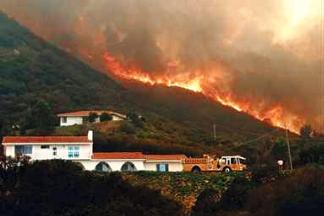 If you were told that you had five-minutes to evacuate your current home or you and your family would perish, what would you do?
If you were told that you had five-minutes to evacuate your current home or you and your family would perish, what would you do?
If you already had an emergency backpack or suitcase packed for each member of your family then you could spend those five minutes collecting any food, medicine, and clothing that you should take with you, along with any jewelry or other valuables, and your family photograph album, and your fireproof metal box that already contains the original copies of all your birth certificates, marriage licenses, diplomas, school transcripts, business certifications or licenses, deeds, wills, and other important documents.
If you had taken the time to think about this ahead of time then you should have already made a list of the items you absolutely wish to take with you along with where those items are usually stored. This list will help you to quickly collect everything you really need without overlooking something critical due to the pressure of the current evacuation situation.
The emergency backpack or suitcase is usually referred to as a bug-out-bag of "BOB" for short. More information about bug-out-bags is on my website here.
Other Really Useful Items
 22 Gauge Floral Wire:
22 Gauge Floral Wire:
During a hard times event a number of simple repairs can be made if you just have some thin wire, and a number of simple things can be constructed if you have some thin wire. You can find the 115 feet package of 22 gauge floral wire for sale for about $3.00 in the artificial flower section of stores such as Walmart. They normally have two colors in stock: green and silver. It would probably be a good idea to purchase both colors of wire for a variety of emergency uses. (Note: They also sell the 26 gauge floral wire but the 26 gauge wire is too thin for almost everything except floral arrangements.)
Plastic Storage Containers with Snap-On Lids:
Invest in high quality containers with good tight-fitting lids in a variety of sizes.
Some of the things in your backpack could be stored inside these containers, such as your personal hygiene items (comb, bandages, folding compact mirror, etc.).
You could also put some of your clothes and other things inside one of these containers. The reason for putting your clothes in the container would not be to keep your clothes safe. Instead the reason would be to get the storage container inside your backpack so that it is not taking up extra space just by itself. Later, during a hard times tragedy event you will probably find a multitude of practical uses for your plastic storage containers.
Heavy-Duty Zipper Freezer Bags:
Invest in the more expensive heavy-duty zipper freezer bags. Although these bags are not completely air-tight or water-tight they are much better than the cheaper bags and they can be reused several times before they gradually wear out.
Store some of the things in your backpack inside these zipper bags, such as the toothpaste.
Some items may require a two-gallon size bag which cost about $3.50 for a box of ten zipper bags.
Where Will You Live?
 In my opinion the safest place for most families to live would probably be the home or apartment where they currently live. However, depending on the type of hard times event, it might be better if you abandoned your home. This is the type of decision that would need to be made based on a variety of different variables that you would not know until the decision actually needed to be made.
In my opinion the safest place for most families to live would probably be the home or apartment where they currently live. However, depending on the type of hard times event, it might be better if you abandoned your home. This is the type of decision that would need to be made based on a variety of different variables that you would not know until the decision actually needed to be made.
For example, if a forest fire was headed in your direction then a decision to stay where you are could prove to be fatal.
Therefore it would be good idea to have at least one or two backup locations that you could retreat to in the event that it becomes necessary.
For most families the most obvious choice would be the home or apartment of another close family member, such as your parents, or a brother, or a sister, or maybe even the home of one of your children.
However, in addition to this obvious first choice, you should also have considered the possibility that your first choice might not exist at the time you really needed it. For example, three days earlier an earthquake could have destroyed the place you had originally planned to retreat to. Therefore you should have a second option to fall back on.
For most families this may mean living inside their vehicle or inside a tent. Let's examine both options:
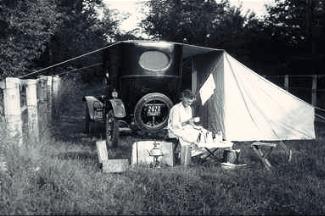
- Vehicle: Most vehicles are too small to be comfortable for more than two people. Even two people will usually find that the space inside a vehicle is not adequate for a long period of time. However, if you have a mini-van or a regular size van then you may actually be able to live inside it for period of time until you can locate more suitable arrangements. After removing the rear seats, a van will allow you to store a lot of your belongings in plastic tote containers or plastic buckets on the floor of the van. You could then put a full size or queen size mattress on top of those containers. The size of the mattress would depend on the size of the van. This would give you a place to sleep at night if the weather outside was not too cold. (Note: If your containers and buckets are a variety of different sizes then you may need to put a flat sheet of thin plywood on top of the taller containers and then put your mattress on the plywood.)
- Tent: If you have children then a tent is a better option than living inside your vehicle. However, it will only be acceptable for a short period of time, and then only if the weather outside is not too cold. However, it would allow you to lie down at night on an air mattress or a folding cot and get some sleep. The major disadvantage of a tent is that it is not as secure or safe as sleeping inside a vehicle.
Sleep Deprivation:
Regardless of which of the above two options you select, one of the most important considerations will be your ability to get some sleep at night. Sleep deprivation during a hard times event will gradually reduce your ability to make good decisions. Therefore, whichever option you select you will need to think about the sleeping arrangements very carefully and make sure you have a regular mattress, or a folding cot, or an air mattress for each member of your family, along with the corresponding number of pillows, sheets, blankets, or sleeping bags. (Note: Sleep deprivation is one of the reasons that most government shelters would be unacceptable as a backup alternative during a hard times event.)
Government Shelters:
If you are absolutely certain that the hard times event will be over in a week or two, then a temporary government shelter might be okay. The major problems will be that they will be over crowded, and there will be people there that you absolutely would never allow your family to associate with during normal times, such as alcoholics, prostitutes, sex offenders, drug addicts, and hardened criminals who just happen to be between visits at the state penitentiary. Therefore, you need to think very carefully before you enter any type of government shelter. If the shelter is a "temporary" shelter inside a local church or public school then it might be a little better than the typical government run shelter.
 If you know from the beginning that the hard times event is going to last a very long time then I suggest that you not enter any type of shelter. Once you are inside the shelter you may not be allowed to leave regardless of what you may have been told when you voluntarily walked through the front door. The people you will meet inside the shelter will have nothing to say except to repeat their heart-breaking stories. You will also find yourself among a group of people who have rarely ever worked but who are exceptionally well skilled at knowing how to survive by stealing from others.
If you know from the beginning that the hard times event is going to last a very long time then I suggest that you not enter any type of shelter. Once you are inside the shelter you may not be allowed to leave regardless of what you may have been told when you voluntarily walked through the front door. The people you will meet inside the shelter will have nothing to say except to repeat their heart-breaking stories. You will also find yourself among a group of people who have rarely ever worked but who are exceptionally well skilled at knowing how to survive by stealing from others.
Cabin Cave:
If the hard times event is one that will be relatively long in duration, such as several years, then your vehicle or tent or a government shelter will not be acceptable. If you try to live inside a tent or your vehicle then your family will freeze to death during the winter months. During a long-term tragedy event a "cabin cave" would probably be your best long-term solution. To build a "cabin cave" you will need a shovel, a good saw, a hatchet, some 22-gauge wire, and a few tarps. Complete instructions for building a "cabin cave" are on my website here.
Always Have a Backup Plan
By this time you have probably noticed that for almost every topic that has been discussed there have been several different options for you to consider. Having options, or a backup plan, significantly increases the chances of your family's long-term survival.
You and your spouse should take the time to seriously discuss your backup plan and the two of you should agree on what would work best for your family.
Close Relatives:
 If your backup plan involves going to live with some of your very close relatives in the country then you should discuss this possibility with those relatives now. Get their permission that it would be okay with them. Then ask them if it would also be okay if you could please store some basic food items, some clothes, and a firearm and some ammunition at their location. This would demonstrate that you do not intend to become a burden to them but you will do everything within your power to provide for the needs of your own family members if an unexpected hard times event forces you to come live with them.
If your backup plan involves going to live with some of your very close relatives in the country then you should discuss this possibility with those relatives now. Get their permission that it would be okay with them. Then ask them if it would also be okay if you could please store some basic food items, some clothes, and a firearm and some ammunition at their location. This would demonstrate that you do not intend to become a burden to them but you will do everything within your power to provide for the needs of your own family members if an unexpected hard times event forces you to come live with them.
Note 1: Every member of your family will need to adjust their life style and their habits and everyone will need to 100% comply with any and all of the rules of the head of the household at your backup location regardless of whether or not you agree with those rules. Please explain to each member of your family that you will not be waited on hand and foot and you will not have your every whim instantly gratified. Instead your family will be temporary residents that can be instantly evicted if everyone does not behave in a manner that is acceptable to your relatives. It will just take one rebellious family member to get everyone evicted. Explain to your family that if you are evicted then your next location living under a bridge will be significantly worse than where you currently are.
Note 2: If you are the family member who still has a safe place to live and some of your close relatives ask your permission to come live with you then you need to decide whether or not this will be acceptable to your entire family. If you say "yes" then please make sure that everyone in that other family 100% understands the information in the above paragraph, and that they will be asked to immediately leave if they do not follow all the rules you have established for your household. Your rules are not open for negotiation. In addition everyone who comes to live with you will have assigned chores that they must do every day, such as: sweep the floor, wash the dishes, do the laundry, or work in the garden. And every adult will need to find some type of job even if it only pays minimum wage. Every adult should be given a reasonable period of time to find a full-time or part-time job, such as two or three-weeks. One-third of every person's paycheck, whether it is a big paycheck or a little tiny paycheck, will be given to you as "rent" to help you pay a portion of your normal household expenses, such as your mortgage payment and your utility bills. These "rent payments" will not give the other family part ownership in your home or the right to misuse the utilities or the right to start making their own rules. The "rent payment" will also not include free food. The other two-thirds of each person's paycheck should be used by the other family to purchase food, and gasoline, and other necessities for themselves. If your close relatives do not like these arrangements then they will need to find someplace else to live. I suggest that you think very carefully about who you allow to come live with you because every family, including my own, has some people who are basically lazy and they always have some excuse for why they can't find a job, or why they had to quit the job they just had, or why they can't do the chores assigned to them. If you have one or more of these people living with you, or someone who always gripes and complains, then you will need to evict them from your household the minute you get fed up with their behavior. In my opinion the hard times are probably going to get a lot, lot worse before they gradually start to improve and these types of individuals will significantly reduce the chances for the long-term survival of your spouse and children. In my opinion, if you suspect there is a very small chance that things would not work out in the long run with the another family living with you, then you should not allow them to move in with you to begin with. Instead you should say no when they first ask and then explain why using one or more of the following reasons:
- There is not enough space in your house for the other family, not even for one night.
- You can't afford to feed the other family.
- You can't allow all of your close relatives and friends to live in your home and instead of making an exception for one family and showing favoritism you must treat everyone the same and you must say no to everyone who asks. If you take in one family and then refuse to take in another family then that other family will hate you for the rest of their lives and they will blame every bad thing that happens to them from that day forward on your refusal to take them in.
There will be fewer long-term bad feelings if you do not start a dependency relationship than if you start one and then have to stop it. You and your spouse should seriously discuss this now and together you will need to decide if you will say no to another family or to all the other families that ask. If you say no then do not let the other family load you down with guilt and pity for not taking them in. After you say no you will need to bring the conversation to a close as soon as possible to prevent the conversation from going downhill and having things said that should never have been said. It may become necessary to politely say, "I have to go now. Good-bye." and then immediately hang up the phone very gently while the other person is still complaining, or immediately but gently close the door to your home while the other person is still trying to get you to change your mind. If they are at the front door to your home and they keep banging on your door and they refuse to leave then politely and calmly say through the closed door, "You are creating a disturbance. I am calling 911 now. The police will be here in a few minutes to escort you off this property." Then call 911 and explain the situation to them and let the proper authorities handle the situation in the same manner that they have probably handled dozens of similar situations in the past few days. This will be much easier if you have kept the other family standing outside the door to your home instead of inviting them inside to explain their situation to you. Let the other family make their request outside at the door to your home and not inside your living room.
Rental Storage Building:
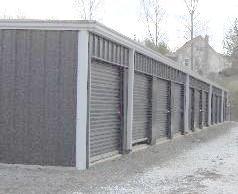 Another type of backup plan would be to rent a small storage area in a temperature controlled building in a small rural town that you consider a reasonable place to live and raise your family. The cost of the storage area will usually be somewhere between $35 to $70 per month depending on the size of the storage area. You will probably need an area that is at least 6-feet wide by 8-feet deep by 8-feet tall. You will be allowed to put your own padlock on the storage area door so you would be the only one who would have access to that storage area as long as you keep your rent payments up to date. I suggest that you always keep your rent paid at least three months in advance. You could then store a variety of long shelf life food items, clothing, kitchen utensils, sheets, pillows, air mattresses or cots, and camping gear inside your storage area. This could be your "Plan B" in the event you had to quickly abandon your current location.
Another type of backup plan would be to rent a small storage area in a temperature controlled building in a small rural town that you consider a reasonable place to live and raise your family. The cost of the storage area will usually be somewhere between $35 to $70 per month depending on the size of the storage area. You will probably need an area that is at least 6-feet wide by 8-feet deep by 8-feet tall. You will be allowed to put your own padlock on the storage area door so you would be the only one who would have access to that storage area as long as you keep your rent payments up to date. I suggest that you always keep your rent paid at least three months in advance. You could then store a variety of long shelf life food items, clothing, kitchen utensils, sheets, pillows, air mattresses or cots, and camping gear inside your storage area. This could be your "Plan B" in the event you had to quickly abandon your current location.
Emergency Gasoline for your Primary Vehicle:
If a hard times event strikes suddenly and unexpectedly then you may need some gasoline to get to your "Plan B" location. However, storing gasoline is dangerous and therefore you should consider the following:
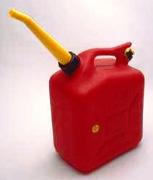
- Always comply with your local fire safety laws.
- Purchase and store either one or two 5-gallon containers of gas. These should be containers that are specifically designed for the safe storage of gasoline.
- Store your gasoline in a safe location and avoid breathing the gas fumes. A reasonable location might be the same place you store your lawn mower. The storage area should have a lock on it to prevent the loss of your lawn mower and your gasoline.
- It is best to purchase your gasoline during the cold winter months because the winter gas formula is better than the warm weather gas formula for long-term gas storage.
- Buy the highest octane available, such as 93 octane. The higher the octane rating the longer the gas will remain effective in storage.
- Treat your gasoline before you put it into storage. In my opinion PRI-G is the best gas treatment available. A 16-ounce container costs about $22 and it will treat 216 gallons of gas. PRI-G may also sometimes be used to rejuvenate old gas that has gone stale.
- Each winter put the one-year old gasoline that you have in storage inside your vehicle and use it. Then refill your gas containers with fresh gasoline and immediately treat that fresh gasoline with PRI-G gas treatment following the instructions on the PRI-G container.
Secrecy

- Don't discuss your disaster plans with anyone except your spouse. Don't even discuss your plans with your children because children like to brag about their parents and it won't be long before everyone knows everything about your plans.
- Most people will not prepare but they will remember that you talked about it and that you are prepared.
- When their children get hungry they will come knocking on your door.
- They will politely ask you to share everything you have with them. If you don't share what do you think they will do next?
- If you do share then they will keep coming back every day for another handout.
- They will also tell anyone who asks them exactly where they got their free supplies. If they don't tell where they got their supplies what do you think would happen to them? Will they put your family's safety above the safety of their own family?
- How many different families can you feed and how long can you feed them?
- After you run out of supplies trying to feed dozens of families, what will happen to your family?
Other People
People generally fall into one of three very broad groups as follows:
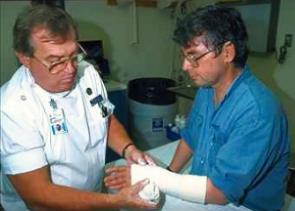
- A very small but very powerful group of "elite" families who have control over a significant portion of the world's resources.
- People who are "too smart" to work because they know:
- They can get the "entitlement welfare system" to provide for some of their needs, plus
- They can get honest hard working people to provide for some of their needs due to "pity," plus
- They will steal what they want when they see they can get away with it and there is no chance of their being caught or punished.
- Honest people who do all the honest necessary jobs within the society, such as an emergency room physician, an automobile repair mechanic, and a restaurant worker who earns minimum wage. These individuals normally would rather work than beg. Therefore they end up supporting both of the above two groups of people.
Hard times occur when a large percentage of the honest hard-working people lose their jobs and they are unable to find any type of work of any nature. This creates significant problems for a society for three basic reasons:
- There is not enough tax revenue to support the government in its current size. Therefore governments must either increase the tax burden on its citizens who are still working, or downsize its operations.
- The amount of "entitlement" benefits cannot be maintained at their former level and therefore the system cannot add all the honest hard-working people who have lost their jobs into the "entitlement welfare programs." Therefore the government must come up with some "creative reasons" why the honest people who are now out of work are not qualified for the same benefits as the people who have never worked.
- The amount of "freewill charity" is drastically reduced because people can just barely support themselves and their extended family members who are now living with them. Freewill charity consists of voluntary donations to organizations such as the United Way and Food Pantries that distribute free food to needy families.
During a serious hard times tragedy event other people will quickly become one of the most dangerous problems you will have to deal with.
Please don't lie to yourself about what other people are capable of doing when they are faced with a life threatening situation.
You should be emotionally prepared to see the dark side of people you may have known for many years.
People will do whatever they believe is necessary to save themselves and their children from starvation or death.
To survive a serious long-term tragedy event you will need to become part of a small close-knit community, or your family will need to live by yourselves in the middle of a wilderness area for both of the following reasons:

- Some members of our society are evil and they are just waiting for some type of disaster to happen so they can do all the unspeakable things they have been wanting to do for many years but they were afraid to do because they might get caught and punished. When there is a very, very small chance of being caught and punished then these individuals will start doing horrible things because they know they have nothing to fear from honest law-abiding citizens because honest people would never consider harming them in any way. Therefore it will be extremely easy for these evil individuals to gain the trust of honest people through some type of "hard luck story" and then when their guard is down to quickly and easily kill all of them and then take everything they have.
- The overwhelming vast majority of the people in the United States are "spoiled" and they have never had to live for any extended period of time in conditions that people in third world countries would be very happy with but which people here in the United States would find totally unacceptable. This will be a significant problem during the first few months of a serious hard times tragedy event. Most people will not be able to adjust and accept a lower standard of living that only includes clothes to wear, a safe place to sleep at night, one or two decent meals every day, and a lot of spare time to read or relax. Their past life experiences will not allow them to accept this basic level of survival and they will look for some way to improve their daily lives, even if it is only for a very brief period of time. Their refusal to be content with the basic essentials of life will be the primary reason they will not live very long, and it will also be the reason that anyone who is associated with them will also have a very short life expectancy. I suggest that you think about this very carefully and then make your own decision on whether or not you are emotionally prepared to live in a more primitive 1800s lifestyle until you reach a ripe old age.
Things to Avoid
- Avoid becoming a prisoner:
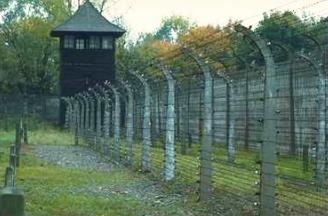
- During a hard times tragedy event don't become a prisoner.
- Don't become a prisoner of the government, or a group of criminals, or another person.
- During a hard times tragedy event the overwhelming vast majority of prisoners don't survive.
- The living conditions within a prisoner-of-war camp are horrible. There is no running water or sewer systems. But every prisoner still needs to relieve himself at least once a day and therefore the ground gradually fills up with human waste. This human waste attracts flies and other disgusting creatures. A variety of diseases rapidly spread throughout the entire prison camp. And there is nothing the prisoners can do about it.
- There are no "real" statistics on prisoner survival because no nation would admit to what really happened to the prisoners under their control.
- But the reality is that there is no spare food or extra medicine to give to prisoners.
- And if the prisoners are kept hungry and weak then it makes it easier to control them and it helps to avoid any type of uprising or revolt or escape attempt.
- Starving prisoners are not able to think as clearly as healthy people. Starving prisoners make more serious mistakes.
- Starving prisoners will gradually die from natural causes, such as dysentery. This makes space for the next group of prisoners.
- Therefore don't become a prisoner during a hard times tragedy event.
- Avoid becoming a refugee:
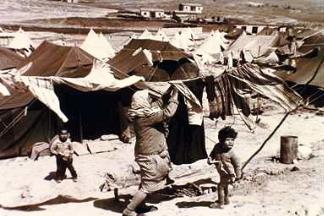
- A refugee is an individual who has had to abandon his or her home in order to stay alive.
- A refugee only has what he could carry with him. This may be nothing more than the clothes he is wearing but most of the time it also includes a few things he was able to salvage from his home before abandoning it.
- A refugee's only hope for survival is to accept whatever donations and charity he may receive from the government, and from relief organizations, and from the citizens of the surrounding area.
- Refugees are not able to find any type of work and therefore they can't support themselves or provide their own food.
- The living conditions in a refugee camp are horrible. Human waste quickly accumulates on the ground and disease rapidly spreads throughout the refugee area.
- The average life expectancy of the vast majority of the refugees can be measured in weeks. Some die during the first few days but some survive for several months.
- When we watch the aftermath of a disaster event on television we normally only see the impact of relief efforts for the first few weeks in the disaster area. What we don't see on television is what happens when the media gradually shifts its attention away from the disaster area and the voluntary donations to the disaster area are gradually used up and the people are once again forced to provide for themselves. When that happens the average life expectancy of the surviving refugees can be measured in days or weeks.
- Don't become a refugee. Always have a backup plan that includes a reasonable destination to flee to where you have previously stored some basic food, supplies, and equipment before the disaster event occurred.
- If 100% of your emergency supplies are stored at your current residence then you will have created the perfect conditions for you and your family members to become homeless, helpless refugees if an unexpected disaster event destroys your home, or forces you to quickly abandon your home.
- Avoid farm livestock and household pets: The reasons are discussed in detail on my website here.
- Avoid a huge garden and a green house: This is an open invitation to everyone to come and steal from you because you obviously have far more than you need.
- Avoid a specialty skill that is difficult or time consuming to learn: This would be any skill that requires a investment in equipment and many years of training that will far exceed the price of the item you are trying to make yourself.
For example, which of the following activities would be the best use of your time and your money?

- Buy some cotton seeds. Plant those seeds. Take care of your cotton plants while they grow. Water them if they need it. Learn how to pick cotton without destroying your hands. Buy a spinning wheel. Learn how to spin cotton into thread on the spinning wheel. When you are finished you will have some homemade yarn or some homemade thread. It may not be the best quality you have ever seen but you will be proud of it because you will have invested more than one year in learning how to make it yourself.
or:
- Visit the sewing goods department at your local Walmart store and buy one 3,000 yard spool of high quality thread for $1.94 per spool. The 3,000 yard spool of thread will probably be sufficient for all your family's sewing needs for at least twenty-years during a hard times tragedy event.
When you take the time to carefully think about the above and you use simple common sense to compare the two options, isn't the best answer obvious?
Conclusion
That concludes my comments on "How to Start Preparing for Hard Times."
I hope that you found something of value in my comments that will prove useful to you in the years ahead.
Respectfully,
Grandpappy.
Grandpappy's e-mail address is: RobertWayneAtkins@hotmail.com




































 Nobody knows how the future will unfold. And that includes myself.
Nobody knows how the future will unfold. And that includes myself. Do you remember the moral of Aesop's Fable of "The Race between the Turtle and the Rabbit?"
Do you remember the moral of Aesop's Fable of "The Race between the Turtle and the Rabbit?" Safety is always important but it is of critical importance during a hard times event because professional emergency medical care may not be immediately available. Therefore, always begin by learning and practicing all the relevant safety rules for whatever you are attempting to do.
Safety is always important but it is of critical importance during a hard times event because professional emergency medical care may not be immediately available. Therefore, always begin by learning and practicing all the relevant safety rules for whatever you are attempting to do. The easiest way to capture rainwater is to use heavy-duty tarps. Heavy-duty tarps can be purchased at almost any store that sells camping supplies, including your local Walmart store. These tarps come in a variety of sizes but the most practical sizes for rainwater collection are the 9-foot by 10-foot tarp (about $12) up to the 10-foot by 12-foot tarp (about $14). Smaller tarps will not capture enough rainwater and larger tarps are too difficult to use.
The easiest way to capture rainwater is to use heavy-duty tarps. Heavy-duty tarps can be purchased at almost any store that sells camping supplies, including your local Walmart store. These tarps come in a variety of sizes but the most practical sizes for rainwater collection are the 9-foot by 10-foot tarp (about $12) up to the 10-foot by 12-foot tarp (about $14). Smaller tarps will not capture enough rainwater and larger tarps are too difficult to use.
 During a long-term hard times tragedy event you will eventually run out of dental floss. It is possible to use very thin fishing line as a substitute for dental floss. You can purchase a 700 yard reel of monofilament fishing line for about $2.50 in the Sporting Goods section of Walmart. One 700 yard reel of fishing line is equal to approximately 12.7 spools of dental floss (55 yards per spool). The monofilament fishing line is sold in 700 yard reels for $2.50 per reel in all of the following sizes: 4 pounds (0.008" diameter), 6 pounds (0.009" diameter), 8 pounds (0.011" diameter), 10 pounds (0.012" diameter), and 12 pounds (0.013" diameter). Since the average space between our teeth varies from person to person you may need to experiment with more than one diameter to determine a size that works best for the individual members of your family. (Note: If you have a few fish hooks then you could tie about 20 feet of fishing line to the end of a long strong stick and you could make your own homemade fishing pole.)
During a long-term hard times tragedy event you will eventually run out of dental floss. It is possible to use very thin fishing line as a substitute for dental floss. You can purchase a 700 yard reel of monofilament fishing line for about $2.50 in the Sporting Goods section of Walmart. One 700 yard reel of fishing line is equal to approximately 12.7 spools of dental floss (55 yards per spool). The monofilament fishing line is sold in 700 yard reels for $2.50 per reel in all of the following sizes: 4 pounds (0.008" diameter), 6 pounds (0.009" diameter), 8 pounds (0.011" diameter), 10 pounds (0.012" diameter), and 12 pounds (0.013" diameter). Since the average space between our teeth varies from person to person you may need to experiment with more than one diameter to determine a size that works best for the individual members of your family. (Note: If you have a few fish hooks then you could tie about 20 feet of fishing line to the end of a long strong stick and you could make your own homemade fishing pole.) Thread and Needles with Big Eyes:
Thread and Needles with Big Eyes: If you were told that you had five-minutes to evacuate your current home or you and your family would perish, what would you do?
If you were told that you had five-minutes to evacuate your current home or you and your family would perish, what would you do? 22 Gauge Floral Wire:
22 Gauge Floral Wire: In my opinion the safest place for most families to live would probably be the home or apartment where they currently live. However, depending on the type of hard times event, it might be better if you abandoned your home. This is the type of decision that would need to be made based on a variety of different variables that you would not know until the decision actually needed to be made.
In my opinion the safest place for most families to live would probably be the home or apartment where they currently live. However, depending on the type of hard times event, it might be better if you abandoned your home. This is the type of decision that would need to be made based on a variety of different variables that you would not know until the decision actually needed to be made.
 If you know from the beginning that the hard times event is going to last a very long time then I suggest that you not enter any type of shelter. Once you are inside the shelter you may not be allowed to leave regardless of what you may have been told when you voluntarily walked through the front door. The people you will meet inside the shelter will have nothing to say except to repeat their heart-breaking stories. You will also find yourself among a group of people who have rarely ever worked but who are exceptionally well skilled at knowing how to survive by stealing from others.
If you know from the beginning that the hard times event is going to last a very long time then I suggest that you not enter any type of shelter. Once you are inside the shelter you may not be allowed to leave regardless of what you may have been told when you voluntarily walked through the front door. The people you will meet inside the shelter will have nothing to say except to repeat their heart-breaking stories. You will also find yourself among a group of people who have rarely ever worked but who are exceptionally well skilled at knowing how to survive by stealing from others. If your backup plan involves going to live with some of your very close relatives in the country then you should discuss this possibility with those relatives now. Get their permission that it would be okay with them. Then ask them if it would also be okay if you could please store some basic food items, some clothes, and a firearm and some ammunition at their location. This would demonstrate that you do not intend to become a burden to them but you will do everything within your power to provide for the needs of your own family members if an unexpected hard times event forces you to come live with them.
If your backup plan involves going to live with some of your very close relatives in the country then you should discuss this possibility with those relatives now. Get their permission that it would be okay with them. Then ask them if it would also be okay if you could please store some basic food items, some clothes, and a firearm and some ammunition at their location. This would demonstrate that you do not intend to become a burden to them but you will do everything within your power to provide for the needs of your own family members if an unexpected hard times event forces you to come live with them. Another type of backup plan would be to rent a small storage area in a temperature controlled building in a small rural town that you consider a reasonable place to live and raise your family. The cost of the storage area will usually be somewhere between $35 to $70 per month depending on the size of the storage area. You will probably need an area that is at least 6-feet wide by 8-feet deep by 8-feet tall. You will be allowed to put your own padlock on the storage area door so you would be the only one who would have access to that storage area as long as you keep your rent payments up to date. I suggest that you always keep your rent paid at least three months in advance. You could then store a variety of long shelf life food items, clothing, kitchen utensils, sheets, pillows, air mattresses or cots, and camping gear inside your storage area. This could be your "Plan B" in the event you had to quickly abandon your current location.
Another type of backup plan would be to rent a small storage area in a temperature controlled building in a small rural town that you consider a reasonable place to live and raise your family. The cost of the storage area will usually be somewhere between $35 to $70 per month depending on the size of the storage area. You will probably need an area that is at least 6-feet wide by 8-feet deep by 8-feet tall. You will be allowed to put your own padlock on the storage area door so you would be the only one who would have access to that storage area as long as you keep your rent payments up to date. I suggest that you always keep your rent paid at least three months in advance. You could then store a variety of long shelf life food items, clothing, kitchen utensils, sheets, pillows, air mattresses or cots, and camping gear inside your storage area. This could be your "Plan B" in the event you had to quickly abandon your current location.







